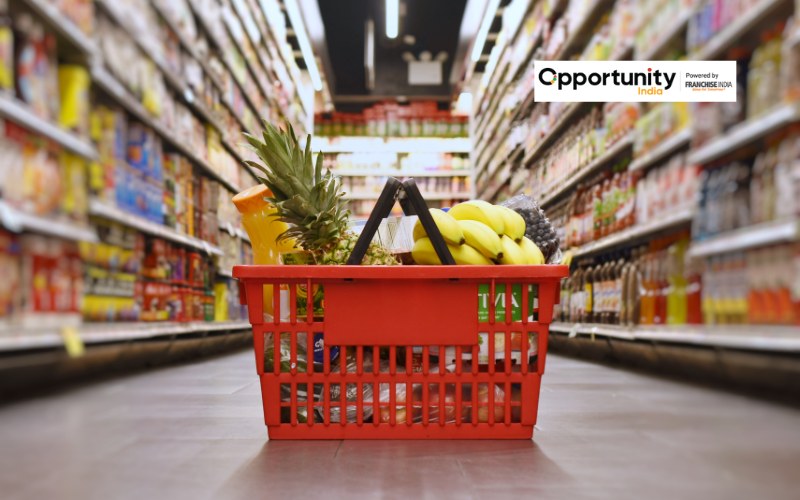
Have you ever considered opening your own supermarket? It's among the best and most reliable business ideas available in 2025. People may spend less on luxuries, but what about groceries? No home can compromise on that. If you've been considering starting a grocery store, whether it's a small neighborhood kirana shop or a full-fledged mini supermarket, you've come to the correct spot. We'll go over everything you need to know in this article, including what kind of business you can create, what licenses you'll need, how much money you'll need to invest, and how to turn a profit.
Why a Grocery Store is a Smart Business in 2025?
Technology breakthroughs, changing consumer preferences, and a renewed emphasis on value and convenience are all driving changes in the grocery industry. A well-written business plan is more than just a formality for prospective entrepreneurs hoping to break into this crucial sector in 2025; it's your road map to success.
Also Read: Dairy Farm Business Plan in India
The grocery store industry is a clever fusion of physical convenience, digital revolution, and changing consumer expectations in 2025, going beyond the traditional brick-and-mortar retail model. This industry has a lot of potential because of growing urbanization, consumer demand for locally produced and organic goods, and trends toward digital payments and app-based ordering. Whether you live in a semi-rural location, a tier-2 town, or a metropolis, opening a grocery shop can be a wise and long-lasting business decision.
Here’s why you should consider starting a grocery store business in 2025:
Groceries Are a Daily Necessity
Grocery items are a daily necessity which has a huge demand daily, regardless of how the world changes. One of the most fundamental and reliable necessities of everyday living is a grocery shop. These days, people are making a move towards a healthy living, preferring home-cooked meals. This guarantees consistent customer traffic for grocery stores, which makes them a low-risk enterprise motivated by need rather than trends.
Demand for Easy Access and Convenience
The constant busy lifestyle of modern people demands convenience and quick access. While the rise of quick-commerce cannot be denied, several people still like to walk to a nearby grocery store. The best thing is that you can set up your store online as well for a hefty amount of returns. However, a grocery store may establish itself as a reliable community hub with the correct location and stock, providing everyday convenience with a human touch that big internet platforms can't always provide.
Low Entry Barrier and Flexible Scale
You don't need an advanced degree, technical expertise, or a lot of money to start a grocery shop. There are adaptable formats that accommodate your available funds and space, whether your goal is to build a small mini supermarket or a tiny neighborhood kirana shop. This makes it available to family-owned businesses, new business owners, and even people seeking a side gig.
Also Read: Rice Mill Business Plan in India
Opportunity for Innovation and Online Integration
The days of grocery stores using only cash counters and notebooks are long gone. By 2025, small firms can easily transition to digital due to technology. UPI payments, POS billing, inventory software, and even apps like Swiggy, Instamart, or Zepto can all be integrated with your store. You can compete with larger businesses and reach more people than just walk-in clients with this hybrid model.
Rising Demand for Organic and Healthy Foods
Eco-conscious, sugar-free, gluten-free, and organic products are becoming increasingly popular. You may differentiate yourself from other general retailers and draw in high-end, health-conscious customers by leveraging this trend by carrying niche items. Higher profit margins and devoted repeat customers are features that define this segment.

Types of Grocery Stores You Can Start in 2025
Choose a format that works for your target market, location, and budget before opening your store:
Standard Kirana Shop
- A little store that sells necessities for the home.
- Appropriate for nearby communities.
Mini Supermarket
- A medium-sized business that offers a greater selection of goods.
- Better POS systems, staff, and interiors are needed.
Health Food and Organic Grocery Store
- Offers vegan, gluten-free, organic, and health-conscious items.
- Perfect for people who are health-conscious and live in cities.
Online Grocery Store or Hybrid Model
- A physical store that has a website or mobile app integrated.
- Orders can be placed from home and delivered the same day.
Step-by-Step Guide to Start a Grocery Store in 2025
What is Your Business Plan?
Before you think of investing a good amount of money into the business, it is important to conduct some research.
- Who are your target customers?
- Which types of groceries are most popular?
- Is online delivery in high demand?
- Who are your rivals?
Write a thorough business plan that consists of:
- Store format and theme
- Products you plan to stock
- Daily sales goal
- Pricing and marketing plan
- Staffing strategy
- Delivery choices
Also Read: How to Start a Laundry Business in 2025 – Low Investment, High Returns
What Do You Think About the Location?
Your store's location may make or ruin it. Seek out:
- High footfall residential areas
- Visibility from the main road
- Parking space
- Closeness to offices, schools, or apartment buildings
Many prosperous stores are located in tier-2 and tier-3 cities in 2025, where demand is growing despite little competition.

Register a business
Legal requirements to fulfil:
- Shop and Establishment Act Permit
- GST Registration
- FSSAI License (for sales of edible or packaged goods)
- Udyam Registration (for MSME benefits)
- Aadhar, PAN, and bank account under a business name
- Registering a trademark for your brand name is optional.
Design the Store Layout
A pleasant shopping experience, effective stocking, and effortless browsing should all be encouraged by the design of your store.
- Provide distinct areas for groceries, dairy, snacks, drinks, and fresh vegetables.
- Use the right lighting and shelves.
- Install air conditioning if you have the funds.
- Use environmentally friendly products and bags to attract eco-aware customers.
Stocking and Inventory Planning
Assemble a variety of specialist and necessary products:
Basic Categories:
- Cooking oil, rice, flour, beans, and cereals
- Tea or coffee, sugar, and spices
- Biscuits, snacks, and dairy
- Drinks and personal hygiene products
- Fresh fruits and veggies (optional)
Popular Features in 2025:
- Organic foods
- Vegan substitutes
- International Food Items
- Ready-to-eat food
Digital inventory management software is a useful tool for preventing shortages and overstocking.
Also Read: Start Your Dream Cosmetic Business with This Foolproof Business Plan
Hire Staff & Train Them
A small store could only need 2-3 staff. For bigger stores:
- Cashiers
- Stock boys
- Delivery staff (should they be providing delivery)
- Store manager
Train them for:
- Customer support
- POS invoicing
- Hygiene and cleanliness
- Billing and POS System
Don't depend on manual billing. By 2025, consumers expect:
- Digital billing
- Card, UPI, and wallet payment methods
- Loyalty Programs
Add an Online Channel
Consumers adore ease of use, and including digital options is essential in 2025.
Options:
- Create an ordering website or mobile application.
- List your store on websites such as Swiggy, Zepto, Dunzo, and Instamart.
- Provide WhatsApp updates for phone ordering.
Deliveries should be made within a 2–5 km radius. Offer free delivery over a specific purchase amount, or charge a nominal delivery cost.
Also Read: Preschool Business Plan: A Step-by-Step Guide
Investment Breakdown: Grocery Store Business
Here’s an estimate of how much you’ll need to invest, depending on the size and type of store:
Kirana Store (Small scale)
- Shop rent (monthly): ₹10,000 – ₹25,000
- Setup (racks, counter, lights): ₹50,000 – ₹1 lakh
- Initial stock: ₹1.5 – ₹3 lakhs
- POS system: ₹30,000
- Licenses & branding: ₹20,000
- Total Investment: ₹3 – ₹5 lakhs
Mini Supermarket
- Rent: ₹25,000 – ₹70,000
- Setup & decor: ₹2 – ₹3 lakhs
- Stock: ₹4 – ₹7 lakhs
- POS, staff, branding, delivery setup: ₹1.5 – ₹2 lakhs
- Total Investment: ₹8 – ₹12 lakhs
Organic/Niche Grocery Store
- Rent: ₹40,000+
- Setup: ₹2.5 – ₹4 lakhs
- Stock (specialty items): ₹5 – ₹8 lakhs
- Branding, digital marketing, delivery team: ₹2 lakhs
- Total Investment: ₹10 – ₹15 lakhs
If you do it well, operating a grocery store in 2025 is not outdated; rather, it's a growing opportunity. Treat your clients like family, start small, maintain consistency, and never stop changing. A tiny kirana shop can develop into a superstore. Who knows? You might become the next local favorite that people rely on for everyday necessities.

